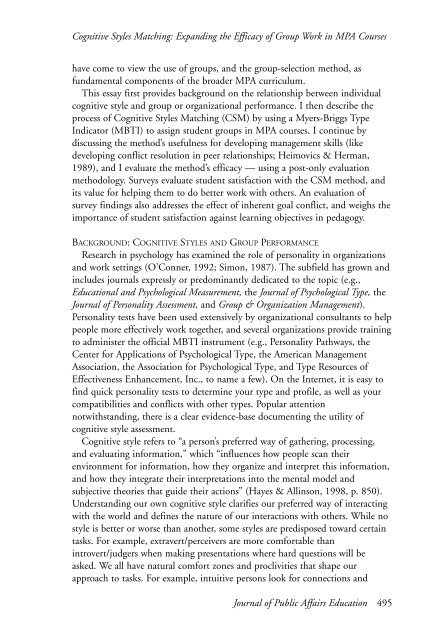JOURNAL OF PUBLIC AFFAIRS EDUCATION - National ...
JOURNAL OF PUBLIC AFFAIRS EDUCATION - National ...
JOURNAL OF PUBLIC AFFAIRS EDUCATION - National ...
You also want an ePaper? Increase the reach of your titles
YUMPU automatically turns print PDFs into web optimized ePapers that Google loves.
Cognitive Styles Matching: Expanding the Efficacy of Group Work in MPA Courses<br />
have come to view the use of groups, and the group-selection method, as<br />
fundamental components of the broader MPA curriculum.<br />
This essay first provides background on the relationship between individual<br />
cognitive style and group or organizational performance. I then describe the<br />
process of Cognitive Styles Matching (CSM) by using a Myers-Briggs Type<br />
Indicator (MBTI) to assign student groups in MPA courses. I continue by<br />
discussing the method’s usefulness for developing management skills (like<br />
developing conflict resolution in peer relationships; Heimovics & Herman,<br />
1989), and I evaluate the method’s efficacy — using a post-only evaluation<br />
methodology. Surveys evaluate student satisfaction with the CSM method, and<br />
its value for helping them to do better work with others. An evaluation of<br />
survey findings also addresses the effect of inherent goal conflict, and weighs the<br />
importance of student satisfaction against learning objectives in pedagogy.<br />
BACKGROUND: COGNITIVE STYLES AND GROUP PERFORMANCE<br />
Research in psychology has examined the role of personality in organizations<br />
and work settings (O’Conner, 1992; Simon, 1987). The subfield has grown and<br />
includes journals expressly or predominantly dedicated to the topic (e.g.,<br />
Educational and Psychological Measurement, the Journal of Psychological Type, the<br />
Journal of Personality Assessment, and Group & Organization Management).<br />
Personality tests have been used extensively by organizational consultants to help<br />
people more effectively work together, and several organizations provide training<br />
to administer the official MBTI instrument (e.g., Personality Pathways, the<br />
Center for Applications of Psychological Type, the American Management<br />
Association, the Association for Psychological Type, and Type Resources of<br />
Effectiveness Enhancement, Inc., to name a few). On the Internet, it is easy to<br />
find quick personality tests to determine your type and profile, as well as your<br />
compatibilities and conflicts with other types. Popular attention<br />
notwithstanding, there is a clear evidence-base documenting the utility of<br />
cognitive style assessment.<br />
Cognitive style refers to “a person’s preferred way of gathering, processing,<br />
and evaluating information,” which “influences how people scan their<br />
environment for information, how they organize and interpret this information,<br />
and how they integrate their interpretations into the mental model and<br />
subjective theories that guide their actions” (Hayes & Allinson, 1998, p. 850).<br />
Understanding our own cognitive style clarifies our preferred way of interacting<br />
with the world and defines the nature of our interactions with others. While no<br />
style is better or worse than another, some styles are predisposed toward certain<br />
tasks. For example, extravert/perceivers are more comfortable than<br />
introvert/judgers when making presentations where hard questions will be<br />
asked. We all have natural comfort zones and proclivities that shape our<br />
approach to tasks. For example, intuitive persons look for connections and<br />
Journal of Public Affairs Education 495

















